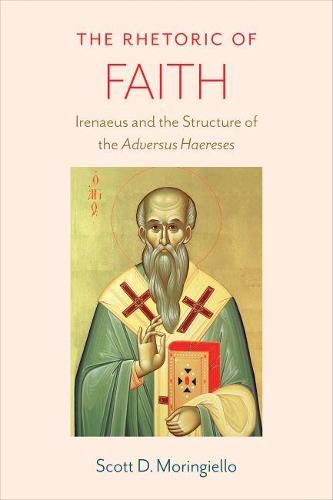Readings Newsletter
Become a Readings Member to make your shopping experience even easier.
Sign in or sign up for free!
You’re not far away from qualifying for FREE standard shipping within Australia
You’ve qualified for FREE standard shipping within Australia
The cart is loading…






The Rhetoric of Faith argues that the structure of Irenaeus’s opus mag num, the Adversus Haereses, is the argument of the Adversus Haereses. Through a close reading of Irenaeus’s text, as well as through a com parison with Greco-Roman rhetorical texts, Scott Moringiello argues that Irenaeus structured his argument around the articles of the faith of the Church and that this structure builds on tropes found in the Greco- Roman rhetorical tradition.
The argument focuses on the Adversus Haereses, although it does be gin with some discussion to put Irenaeus in the context of second cen tury Christian literature. Moringiello concludes with a discussion of Ire naeus’s Demonstration of the Apostolic Preaching.
Other scholars have provided introductions to Irenaeus’s work, and other scholars have argued for the structural unity of the Adversus Haer eses. No other scholar, though, has argued that the faith of the Church is the basis of Irenaeus’s argument. This argument, then, presents an im portant contribution to the field of Irenaeus studies.
Beyond the study of Irenaeus, though, The Rhetoric of Faith offers a contribution to the field of early Christian studies. It argues that the field should focus more on how early Christian authors make their ar guments by attending to the theologically-informed rhetorical strategies they use.
$9.00 standard shipping within Australia
FREE standard shipping within Australia for orders over $100.00
Express & International shipping calculated at checkout
The Rhetoric of Faith argues that the structure of Irenaeus’s opus mag num, the Adversus Haereses, is the argument of the Adversus Haereses. Through a close reading of Irenaeus’s text, as well as through a com parison with Greco-Roman rhetorical texts, Scott Moringiello argues that Irenaeus structured his argument around the articles of the faith of the Church and that this structure builds on tropes found in the Greco- Roman rhetorical tradition.
The argument focuses on the Adversus Haereses, although it does be gin with some discussion to put Irenaeus in the context of second cen tury Christian literature. Moringiello concludes with a discussion of Ire naeus’s Demonstration of the Apostolic Preaching.
Other scholars have provided introductions to Irenaeus’s work, and other scholars have argued for the structural unity of the Adversus Haer eses. No other scholar, though, has argued that the faith of the Church is the basis of Irenaeus’s argument. This argument, then, presents an im portant contribution to the field of Irenaeus studies.
Beyond the study of Irenaeus, though, The Rhetoric of Faith offers a contribution to the field of early Christian studies. It argues that the field should focus more on how early Christian authors make their ar guments by attending to the theologically-informed rhetorical strategies they use.